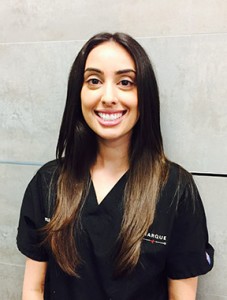What You May Not Know About Migraines by Raveena Dhaliwal
 Migraines cause severe pain and can last anywhere from hours to days. A migraine can cause intense throbbing or a pulsing sensation in one area of the head, which can be accompanied by nausea and vomiting, sensitivity to light and sound, and other side effects such as blind spots, or tingling in your arms or legs. The exact cause of migraines is unknown although we know genetics and environmental factors play a key role. Researches know that chemical imbalances in the brain cause migraines such as serotonin, which help regulate pain in your nervous system. Changes in the brainstem and its interactions with the trigeminal nerve, a major pain pathway, can cause migraines.
Migraines cause severe pain and can last anywhere from hours to days. A migraine can cause intense throbbing or a pulsing sensation in one area of the head, which can be accompanied by nausea and vomiting, sensitivity to light and sound, and other side effects such as blind spots, or tingling in your arms or legs. The exact cause of migraines is unknown although we know genetics and environmental factors play a key role. Researches know that chemical imbalances in the brain cause migraines such as serotonin, which help regulate pain in your nervous system. Changes in the brainstem and its interactions with the trigeminal nerve, a major pain pathway, can cause migraines.
There are many different triggers for migraines including: hormone changes in women, foods (especially foods that contain tyramine), alcohol, caffeine, stress, changes in sleeping patterns, sensory stimuli such as loud noises and bright light, physical factors, and changes in the environment like weather.
Identifying which triggers cause migraines for you can help you reduce your migraines. Often a diary is recommended to keep track of foods that can trigger migraines.
Although there are no cures for migraines, there are treatment options you can discuss with your doctor. Medications can help bring relief to migraines and treat symptoms such as nausea. Medications can be used to bring relief during an attack or for prevention against future attacks. Explaining your symptoms to your doctor can help you distinguish which medications will work best for you or a combination of treatments. Triptans are a class of drugs which are most commonly used when treating migraines; they work by promoting constriction of blood vessels and blocking pain pathways in the brain. Triptans are used to relieve pain and associated symptoms with migraines. Triptans can be administered through nasal sprays, injections and tablets.
Preventative therapies include antidepressants or Botox (Onabotulinumtoxin A). Antidepressants are used to treat migraines by affecting the level of serotonin and other brain chemicals. Botox has been shown to reduce the number of headache days for chronic migraine suffers.
Keep a headache diary even after you see your doctor it can help you learn what your triggers are and keep track of your symptoms or any changes in the frequency of your headaches.
Resource: Mayo Clinic
The information provided is for general interest only and should not be misconstrued as a diagnosis, prognosis or treatment recommendation. This information does not in any way constitute the practice of medicine, or any other health care profession. Readers are directed to consult their health care provider regarding their specific health situation. Marque Medical is not liable for any action taken by a reader based upon this information.
